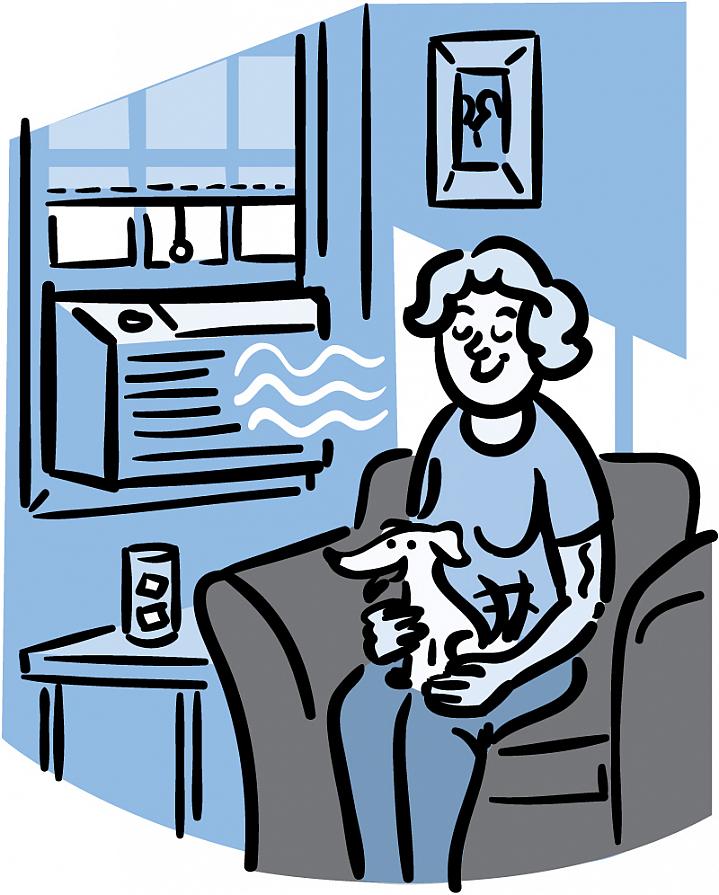Stay Cool
Getting Too Hot Can Be Dangerous

Many people love the warm summer months. But hot and humid days can sometimes be dangerous. It’s not good for the body to be too hot for too long. Too much heat can damage your brain and other organs. It’s important to keep your cool when the days are hot.
Your body has its own natural cooling system. Sweating is key to cooling when hot weather or exercise causes your body temperature to climb. When sweat dries, it carries heat away from your body’s surface and lowers your temperature. When sweating isn’t enough to help you cool down, you’re at risk for a heat-related illness called hyperthermia.
Hyperthermia can happen to anyone. Older people, infants and young children, and people who are ill, obese or on certain medications are especially at risk. These people may be more sensitive to the effects of extreme heat and less likely to sense or respond to changes in temperature.
“High temperatures can cause various organs within the body not to function optimally,” says Dr. Marie Bernard, deputy director of NIH’s National Institute on Aging. Excess body heat can stress the heart and harm the brain. It might even lead to a coma.
Hyperthermia can cause several heat-related illnesses, ranging from mild to serious. These include heat cramps, heat edema, heat exhaustion and heat stroke.
Heat cramps are the painful tightening of muscles in your stomach, arms or legs. If you have heat cramps, find a way to cool your body and be sure to drink plenty of fluids. Heat edema is a swelling in your ankles and feet when you get hot. Elevating your legs should help. If that doesn’t work fairly quickly, check with a health professional.
Heat exhaustion is a warning that your body can no longer keep itself cool. You might feel dizzy, thirsty, weak, uncoordinated and nauseated. Your skin might feel cold and clammy, and you may have a rapid pulse. If this happens, drink plenty of fluids and rest in a cool place. If you’re not careful, heat exhaustion can progress to heat stroke.
Heat stroke is a life-threatening form of hyperthermia that occurs when your body temperature reaches 104° Fahrenheit or more. Heat stroke can lead to confusion, fainting, staggering, strange behavior or dry, flushed skin. Heat stroke is a medical emergency.
“If you and a loved one are at a picnic, for example, and it’s very hot and humid that day, and they start complaining of being dizzy or seem disoriented, you need to be very concerned,” says Bernard. “You need to get them into a cool place, put cool compresses on their neck and wrists, and call 911.”
Air conditioning is the best way to protect against hyperthermia. If you don’t have air conditioning, go to places that are cool on hot and humid days. Try community centers, shopping malls, movie theaters, libraries or the homes of friends and family.
Heat-related illness is preventable. Still, hundreds of deaths from extreme heat events occur in the United States each year. It’s important to be aware of who’s at greatest risk so you can take steps to help beat the heat.
NIH Office of Communications and Public Liaison
Building 31, Room 5B52
Bethesda, MD 20892-2094
nihnewsinhealth@od.nih.gov
Tel: 301-451-8224
Editor: Harrison Wein, Ph.D.
Managing Editor: Tianna Hicklin, Ph.D.
Illustrator: Alan Defibaugh
Attention Editors: Reprint our articles and illustrations in your own publication. Our material is not copyrighted. Please acknowledge NIH News in Health as the source and send us a copy.
For more consumer health news and information, visit health.nih.gov.
For wellness toolkits, visit www.nih.gov/wellnesstoolkits.